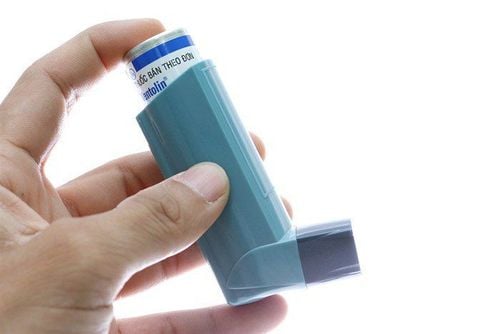This is an automatically translated article.
Acute sinusitis causes the spaces inside the nose (sinuses) to become inflamed and swollen, causing mucus to build up inside and preventing the person from breathing through the nose. Patients should note a number of symptoms to prevent complications caused by acute sinusitis.1. Symptoms of acute sinusitis
Symptoms of acute sinusitis usually include:
Thick, yellow or greenish fluid in the sinuses running from the nose down the throat Nasal congestion makes it difficult to breathe through the nose Pain, swelling and tenderness around the eyes, cheeks , nose or forehead and it gets worse when bending over Ear pain Headache Change in smell Cough Bad breath Fatigue Fever.

Sốt - Biểu hiện của bệnh viêm xoang cấp tính
When to see a doctor?
Most people with acute sinusitis do not need to see a doctor. But see your doctor if you experience any of the following:
Symptoms last for more than a week or longer Symptoms get worse Persistent fever A history of recurrent or chronic sinusitis. See your doctor right away if you have signs or symptoms of a serious infection such as:
Pain, swelling or redness around the eyes High fever Confusion Double vision or vision changes Stiff neck.
2. Who is susceptible to acute sinusitis?
The following factors may increase your risk of developing acute sinusitis:
Abnormalities of the nasal structure such as a deviated septum or nasal polyps Smoking or regularly breathing in other pollutants Having activities leads to pressure changes, such as flying and scuba diving Weak immune system such as HIV infection, cancer treatment Cystic fibrosis Pollen allergy or other allergic disease affecting the sinuses.
3. Complications of acute sinusitis
Complications from acute sinusitis are uncommon and very rarely serious complications. However, if they do occur, complications can include:
Meningitis: An infection in the sinuses can spread to an infection in the brain, causing inflammation of the lining of the brain and the fluid surrounding the brain and spinal cord. Infection can spread to bone causing osteomyelitis or skin causing cellulitis Vision problems: If infection spreads to orbit, causing orbital inflammation, eyelid abscess, optic neuritis vision, inflammation of the lacrimal sac and can cause vision loss or even permanent blindness.
4. Home care
Besides using therapeutic drugs, you can combine the following ways to enhance the effectiveness of treatment drugs and prevent possible complications:Use a humidifier in the room, for example room You can take a shower and sit in a hot bath or inhale the steam from a bowl of warm (but not too hot) water to help relieve the discomfort of a stuffy nose Placing a warm, wet washcloth on your face can help. relieve pain Rinsing your nose with salt water can clear mucus and keep your sinuses moist Drinking plenty of water will help thin the mucus so it's easier to clear mucus from your nose, reducing congestion in your sinuses Rest Get plenty of rest and sleep to give your body time to recover.

Nghỉ ngơi và ngủ nhiều để cơ thể có thời gian hồi phục
To limit complications caused by acute sinusitis, patients need to visit and treat acute sinusitis at a quality and reputable medical facility. The Ear, Nose and Throat specialist at Vinmec International General Hospital is an address specializing in the examination and treatment of sinusitis as well as common ear, nose and throat diseases, head and neck tumors, congenital malformations in the ear, nose and nose area. throat by common surgical methods such as surgery, microscopic or endoscopic tympanic patch, fistula removal surgery, Bondy surgery, nasopharyngeal aerosolization, nasal constriction injection, nasal burning...
Please dial HOTLINE for more information or register for an appointment HERE. Download MyVinmec app to make appointments faster and to manage your bookings easily.
Reference source: Mayoclinic.org












